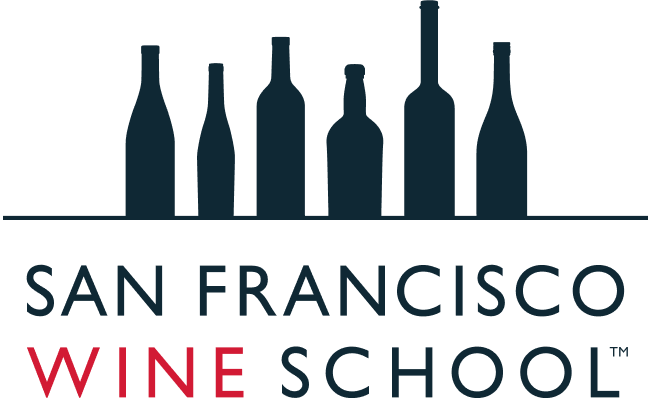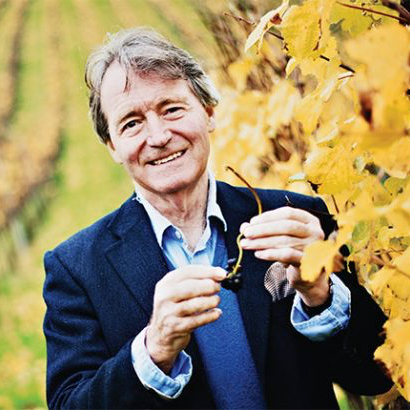by David Furer
No education in wine is complete, even founded well, without time spent learning from the writings of England’s Hugh Johnson. Like many before and since my first encounters with his work stemmed from his historical and encyclopedic books and a video series which were essential to my early understanding of wine. When working at an early job in Chicago soon after I’d the unexpected pleasure of meeting him as he arrived with Christian Pol Roger and Ch. d’Yquem’s Comte Alexandre de Lur Saluces. While living in London I served on the Circle of Wine Writers executive committee when he was its president. I’d organized a tasting of a handful of Germany’s hottest young winemakers at a time when German wines weren’t so readily accepted as they are now. His enthusiasm to attend was mitigated by his informing me in advance that, due to a previous commitment, he’d only be able to participate were the winemakers to stay an additional 30 minutes. Needless to say all of them were eager to bide their time for Johnson just as he was grateful for the meetings and wines. We spoke on the first day of winter 2015 with late autumn in England so mild he commented that “we’ve been out in shirt sleeves.”
How is it you and wine found one another?
I drank wine with my parents, and then when I went to school at Cambridge we drank quite a lot of wine. My roommate took it very seriously, and was a member of the university tasting team; he got me really interested.
What led you to explore working with wine?
I’m a writer, that’s my whole being. At the age of 20 I was looking for a way of earning a living, so I got a job with Vogue magazine, and it wasn’t too long before I persuaded the editor to allow me to write an article about wine.
In the 20 years we’ve known each other I was first impressed when between halls at Vinexpo in 1995 you, with our having met only briefly in a few years earlier, were eager to grant this nascent writer 20 minutes of your time for a spontaneous interview. Later on you had me contribute a bit to one of your pocket guides, one of many writers who do so. Much of what you’ve done, and in passing the baton of your encyclopedia to Ms. Robinson, is steeped in having helped other writers to improve their work.
Well maybe I’m just a big gossip! If you love what you do it engages other people too. I’m glad to hear it.
When you started out had you an inkling of drinkable wine once having been made in England, and the state of it today?
Oh, no, I don’t think anybody had David. I do remember a long time ago, 40 years, visiting the Hambledon vineyard which is now making extremely good fizz near Portsmouth. There was a wonderful chap who’d been terribly important in the diplomatic corps, Sir Guy Salisbury Jones, who’d asked me to lunch. He showed me his little vineyard, unique and told me how he thought it’d all come right. I was honestly skeptical, but look at things now. But you don’t yet have to bother about anything but the sparkling for English wines but that is honestly coming along so rapidly, taking all of us by surprise, and a real business. My son, Red, has started a business exporting drinks called British Bottling Company, the ‘BBC’. I stand on the sidelines shouting encouragement.
What you did in Tokaj 20 years ago was remarkable in helping to reestablish itself to its former glory. What undiscovered or overlooked traditional wine regions of the Old World are needing to be looked at more?
Sometimes it’s a matter of entering where angels fear to tread. They pop up in Italy and Spain in a remarkable way. If you’ve a strong sense of history and want to delve you’ll find that there are many parts of Europe where it all died with phylloxera. We don’t know how these will be received today until we try. Look at how the US market is now discovering the Jura, an area which we’d recently ‘bracketed’. Suddenly smart sommeliers are saying that these wines are quite special.
How should the discerning sommelier inform him or herself to develop an independent and critical palate helping them to purchase and be suitable for the food coming out of their kitchen?
Understanding the chef’s intention and customer expectation should come first. Then try to interpret that on wine terms. That should come before any individual taste of a sommelier.
Your objection for ascribing point scores to wine is well-documented. While this position holds fast in your native Britain, the US consumer’s predilection for being marketed to with point scores and other gimmicks has mostly won out. If we agree that a goal for wine communicators is to increase the consumption of our favorite beverage with the general public, then how can reconcile your position with the rate of wine consumption in the US increasing so dramatically in the past decade, partly attributable to wine being seen as accessible.
Wine is a fairly new taste for some people and they’re looking for an easy answer. It’s no good telling someone new to wine to “drink what you like”—you have to give them a steer. Robert Parker thought of the absolutely ideal way of steering them he latched on to the public school marking system—brilliant. It took a long time to sink in across the pond here for anyone to see what it was he was getting at because it seemed here to be strange, unnatural, and frankly impossible—which I still believe. The accessibility through point scores is very human; it encourages people to look at wine and think they can get a handle on it without having even tasted it. People will say “this is a good wine because it got 95 points” and not because of the way it works in their mouth. Maybe we’re more skeptical or start at a different point with wine in culture in the UK. That’s part of it.
How do you see the web in having affected wine writing today as opposed to when you started?
I’m not an expert in the web as I don’t have time to follow it. I’ll meet a lot of the protagonists when I’m in Napa Valley in February but I won’t pretend to know their work because I don’t read a wine blog.
In addition to your writing of wine you’re also rather expert on trees and gardens with credible books published on these somewhat broader subjects. How has your understanding of vines & wine colored that of gardens and trees, and these of vines?
They’re the same subject practically. The metabolism of plants, what plant is suited to what spot, the relationship between varieties of plants, the ways plants are identified and propagated and cultivated, how pruning is done is all horticultural.
How has your research into wines’ history figured into that of your understanding of its contemporary production?
All understanding starts with the past. History’s part of my DNA. I find it difficult to follow a generation in which history is of no interest; I don’t know about the US but in this country it’s almost banned. The government doesn’t want you to know history because you may have an opinion based upon reality rather than fantasy. That’s putting it a bit strong but I hope you see my point.
When not wine what’s your preferred drink?
I sip water from time to time, rather gingerly.
Hugh Johnson will be the keynote speaker at The Symposium for Professional Wine Writers held
February 16-19 at Meadowood Napa Valley in St. Helena, California. More information may be found at
http://www.winewriterssymposium.org.
Photo above by Jon Wyand.


